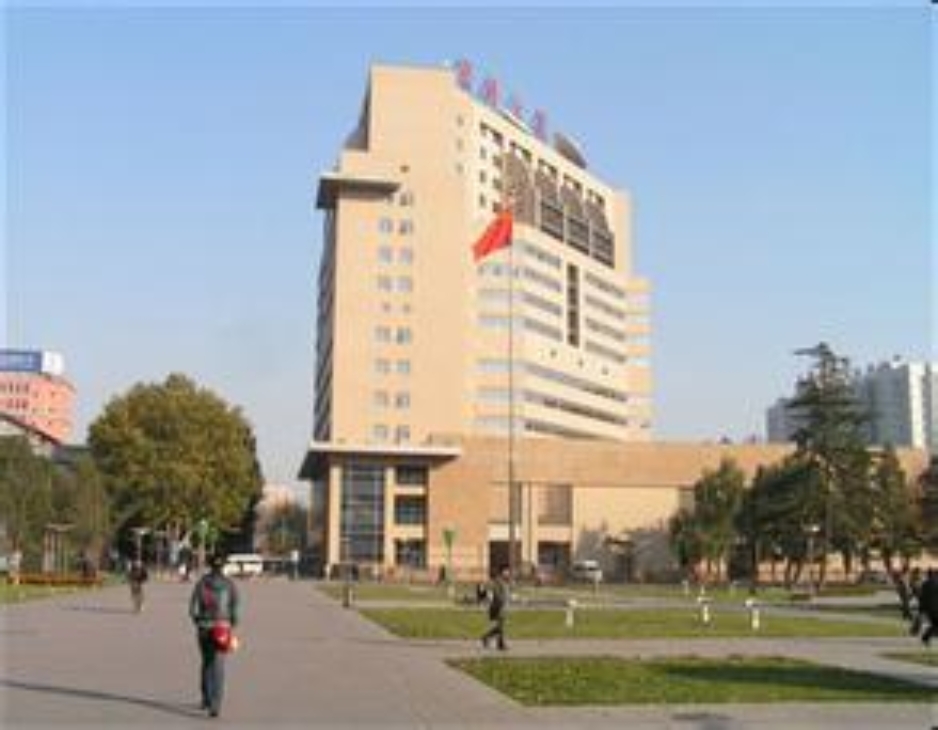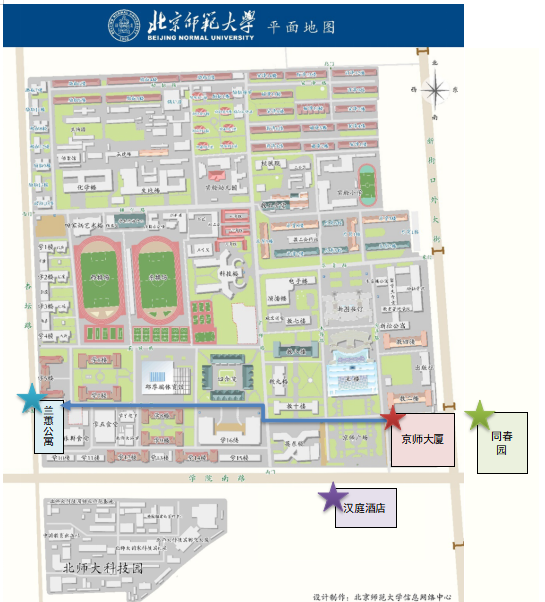Conference Guide
1. Conference Venue
Jingshi Hotel Fourth floor: 9406 (Forenoon) 9406 (Afternoon, Parallel Session A) 9407 (Afternoon, Parallel Session B) 9408 (Afternoon, Parallel Session C) Beijing Normal University #19 Xinjiekouwai Dajie, Beijing 100875 |
京师大厦 四楼: 9406(上午) 9406(下午分会场A) 9407(下午分会场B) 9408(下午分会场C) 766全讯白菜网 新街口外大街19号,北京,100875 |



![]()
![]()

![]()
![]()

![]()

![]()
![]()

Note: Jingshi Hotel is located in the southeast corner of the campus (Red star on the above map)
Hanting Hotel is located across from Jingshi Square (Purple star on the above map)
Tongchunyuan is located to the east of Jingshi Hotel (Green star on the above map)
Lanhui Apartment is located in the southwest corner of the BNU campus (Blue star on the above map)
The blue route is the path from Jingshi Hotel to Lanhui Apartment
注:京师大厦位于北师大校园东南角(图上红色星)
汉庭酒店(积水潭店)位于北师大京师广场南侧(图上紫色星)
同春园位于北师大京师大厦东侧(图上绿色星)
兰蕙公寓位于北师大校园西南角(图上蓝色星)
蓝色线路是从京师大厦前往兰蕙公寓的路线
2. Transportation
Airport to Beijing Normal University
By taxi: about 60min, 100RMB
By shuttle bus: get off at Beitaipingzhuang station, walk toward west, and turn left to the south, 25RMB
By express train: transit in Dongzhimen station, take line 2 and get off at Jishuitan station, and then take the bus 22, or 47, or 88, get off at Beijing Normal University station, 30RMB
首都国际机场—766全讯白菜网
方案一:乘坐出租车约60分钟,费用100元左右。
方案二:乘坐机场大巴到北太平庄站下,往西再往南走500米,费用25元。
方案三:乘坐机场快轨到东直门,换乘2号线到积水潭下,从地铁积水潭站C口出,乘坐22路、47路、88路等在766全讯白菜网站下,费用30元左右。
Beijing West train station to Beijing Normal University
By taxi: about 40min, 40RMB
By subway: take the line 9, get off at the Guojiatushuguan station, and take bus 92, get off at Beijing Normal University station (South Gate).
北京西站—766全讯白菜网
方案一:乘坐出租车约40分钟,费用40元左右。
方案二:由北京西站乘地铁9号线(国家图书馆方向)到国家图书馆站(B口出),再换乘92路公共汽车到766全讯白菜网南门站下车,向东走约100米。
Beijing South train station to Beijing Normal University
By taxi: about 53min, 42RMB
By subway: take the line 4, get off at the Pinganli station, and take bus 22 or 88 at Huguosi station, get off at Beijing Normal University station. Walk toward East about 100m.
北京南站—766全讯白菜网
方案一:乘坐出租车约53分钟,费用42元左右。
方案二:由北京南站乘地铁4号大兴线(安河桥北方向)到平安里站(B口出),再到护国寺站换乘22路或88路公共汽车到766全讯白菜网站下车,向北行走约100米。
Beijing train station to Beijing Normal University
By taxi: about 40min, 40RMB
By subway: take the line 2, get off at the Jishuitan station, and then take the bus 22, or 47, or 88, get off at Beijing Normal University station. Walk toward North about 100m.
北京站—766全讯白菜网
方案一:乘坐出租车约40分钟,费用40元左右。
方案二:由北京站乘地铁2号线(外环)到积水潭站(C口出),再到积水潭南站换乘22路(或88路、47路等)公共汽车到766全讯白菜网站下车,向北行走约100米。
3. For Meals
Lunch for the 2nd and the 3rd: Buffet at Lanhui Apartment, Second floor
2、3日午餐: 兰蕙公寓二层大厅自助
Dinner for the 2nd: Tongchunyuan Restaurant, Second floor, Room Chunhua, Chunlu, Chunlan and Chunyi
2日晚餐:同春园二层春华、春露、春兰、春意包间
Dinner for the 3rd: Xibei Restaurant, Room 010 and 011
3日晚餐:西北餐厅 010、011包间
4.Contact Information of Organizing Committee
Haoran He
Cellphone: 18611159549
Email: haoran.he@bnu.edu.cn
Boyu Zhang
Cellphone: 13522536728
Email: zhangby@bnu.edu.cn
特邀报告人
(姓氏字母排序)


Chew Soo Hong 周恕弘 黄凌波(山东大学,主页)






Program
Nov. 2, 2024 (Saturday) Jingshi Hotel 9406 |
|
Time |
Activity |
8:30-9:00 |
Opening speech |
|
|
9:00-10:30 |
Plenary Session 1 |
From behavioral economicus (BE) to intelligence economicus (IE) Soo Hong Chew |
|
Navigating the clouds: the impact of air pollution on AI chatbot conversations Lijia Wei |
|
|
|
10:30-11:00 |
Group Photo and Tea Break |
|
|
11:00-12:30 |
Plenary Session 2 |
促进女性领导力发展的行为实验研究 王湘红 |
|
政策沟通模糊性、投资者预期与资产价格:实验室检验 宗计川 |
|
|
|
12:30-14:15 |
Lunch |
|
|
Nov. 2, 2024 (Saturday) Jingshi Hotel 9406 |
|
Time |
Activity |
14:15-15:45
|
Parallel Session 1A |
Each talk: 25 min + 5 min Chair-led discussion, Chair: Xianghong Wang |
|
Digital skills and overconfidence: rethinking gender gaps through a lab experiment in China Yingxi Liu |
|
社会形象效用的性别差异研究:基于不当行为传染的实验 林晏清 |
|
Prosocial behavior, gender, and conformity Guocheng Wang |
|
|
|
15:45-16:00 |
Tea Break |
|
|
16:00-17:30
|
Parallel Session 2A |
Each talk: 25 min + 5 min Chair-led discussion, Chair: Lingbo Huang |
|
What if women are more productive in the labor market? — an experiment of unegalitarian labor division in mixed-gender groups Yijie Wang |
|
外部社会比较、内部收入差距与性别分工:基于实验室实验的研究 张辰晔 |
|
认知能力、过度自信与真假信息识别 吴佳隆 |
|
|
|
17:30-19:00 |
Conference Dinner |
Nov. 2, 2024 (Saturday) Jingshi Hotel 9407 |
|
Time |
Activity |
14:15-15:45
|
Parallel Session 1B |
Each talk: 25 min + 5 min Chair-led discussion, Chair: Lijia Wei |
|
A replication of the trust game in a highly immersive virtual reality environment Xu Zhang |
|
Leadership effectiveness in multiple threshold public goods games Jingle Li |
|
Altruism does not always promote cooperation in repeated interactions Kai Kang |
|
|
|
15:45-16:00 |
Tea Break |
|
|
16:00-17:30
|
Parallel Session 2B |
Each talk: 25 min + 5 min Chair-led discussion, Chair: Boyu Zhang |
|
税收凸显性会影响消费选择行为吗? ——来自一项经济学自然实验的证据 郝春虹 |
|
消费者信息与专家服务:信念更新视角下的实验研究 丁预立 |
|
AI辅助决策、主观规范与医疗服务质量——来自医疗服务市场的实地实验证据 夏静文 |
|
|
|
17:30-19:00 |
Conference Dinner |
|
|
Nov. 2, 2024 (Saturday) Jingshi Hotel 9408 |
|
Time |
Activity |
14:15-15:45
|
Parallel Session 1C |
Each talk: 25 min + 5 min Chair-led discussion, Chair: Shuo Liu |
|
Unmasking the privacy paradox: measuring the value of facial photos and travel history Yu Gao |
|
Bystander defending behaviors in workplace cyberbullying: the dehumanization and social presence perspectives Ning Liu |
|
疲劳、社会距离、风险偏好关系实验研究 孙玉彤 |
|
|
|
15:45-16:00 |
Tea Break |
|
|
16:00-17:30
|
Parallel Session 2C |
Each talk: 25 min + 5 min Chair-led discussion, Chair: Jichuan Zong |
|
How does passive investing affect the informational efficiency of prices Yan Peng |
|
Using fNIRS hyperscanning to test neurocognitive mechanisms of deniable misreporting in face-to-face interactions Wei Wang |
|
信贷市场存在所有制歧视吗? 杜唯 |
|
|
|
17:30-19:00 |
Conference Dinner |
Time |
Activity |
14:15-15:45
|
Parallel Session 3B |
Each talk: 25 min + 5 min Chair-led discussion, Chair: Haoran He |
|
If you ought to pay, pay in the middle Jingyi Meng |
|
DRGs 医保支付方式改革、P4P 绩效激励机制与医生行为: 来自真实医生的实验证据 刘莹 |
|
Selection and sorting when supervisors have discretion: experimental evidence from a Tanzanian factory Yihong Huang |
|
|
|
15:45-16:00 |
Tea Break |
|
|
16:00-17:30
|
Parallel Session 4B |
Each talk: 25 min + 5 min Chair-led discussion, Chair: Zhen Zhou |
|
The effect of contemporaneous meat consumption on attitudes and behaviors towards animal welfare Shanshan Zhang |
|
不对称性、替代借口与不当行为:基于规范信息的实验研究 卢露 |
|
The impact of congestion charges and health awareness information on peak-hour driving: a randomized field experiment Duan Su |
|
|
|
17:30-19:00 |
Conference Dinner |
Nov. 3, 2024 (Sunday) Jingshi Hotel 9408 |
|
Time |
Activity |
14:15-15:45
|
Parallel Session 3C |
Each talk: 25 min + 5 min Chair-led discussion, Chair: Hui Xu |
|
教育公平视角下的竞争行为:基于多维竞赛的理论与实验 冷艾琳 |
|
The effect of female role models on students' aspirations for economics studies Yue Zhang |
|
开弓没有回头箭?——沉没成本、参与限制与在线学习效果 刘天寒 |
|
|
|
15:45-16:00 |
Tea Break |
|
|
16:00-17:30
|
Parallel Session 4C |
Each talk: 25 min + 5 min Chair-led discussion, Chair: Min Zhu |
|
Social environment and ingroup favoritism among children Sharon Xuejing Zuo |
|
成长型心态干预对学生人力资本的影响研究 崔驰 |
|
儿童时间偏好与风险偏好的启动效应研究 李华龙 |
|
|
|
17:30-19:00 |
Conference Dinner |
Abstract of Papers
Only affiliations of the presenters are indicated.
Plenary Session 1
“From behavioral economicus (BE) to intelligence economicus (IE)”
Soo Hong Chew (Southwestern University of Finance and Economics)
The traditional homo economicus (HE), serving as the workhorse for much economic modeling and applications over the past centuries, is fully self-interested and endowed with unbounded capacities for reasoning, thinking, computation, cognition, memory, leaving little room for psychology, including emotion, or biology. Since the founding of game theory in the 1940’s, HE has also been enriched with expected utility preference and unlimited strategic sense. The behavioral economicus (BE) who recognizes her many limitations including its being linked to prospect theory (with its share of flaws) emerged almost as a reaction to the accumulating evidence of deviations from HE-style optimality. These include experimental evidence of other-regarding behavior such as altruism and herding, choice paradoxes, and cognitive and attentional limitations. At about 50 years old, might BE be facing her own crisis given the ever-increasing number of anomalies with respect to HE?
Imagine you are in a situation with several dozen university students somewhere in Chengdu where each can receive an amount of money by entering a number between 0 and 100 and the prize goes to the one whose number is closest to 0.7 times the average. Consider how you might approach this p-Beauty problem and what would be the approach taken by HE (who would write 0 in viewing others like herself) and BE (who measures herself against and could come up with just about any number). In their place, we explore an intelligence economicus (IE) approach based on a definition of situation intelligence applied to a choice situation, such as p-Beauty. This approach leverages the identity of the decision maker which includes a range of her actual abilities (reasoning, problem solving, cognition, language, theory-of-mind, and imagination) besides her experience, upbringing, values (including her morals), attentiveness, memory, physiological state, mood, and biology, and encompasses the parallel development of a theory of choice under situation uncertainty. For the p-Beauty example, unlike BE, IE does not view HE as providing a benchmark for decision making especially in a strategic situation. In a non-strategic situation, IE may behave like HE if arriving at the global optimum appears obvious or accessible in a way that is consonant with her physical and mental state in conjunction with her identity (including ability, knowledge, experience, and values).
“Navigating the clouds: the impact of air pollution on AI chatbot conversations”
Lijia Wei (Wuhan University)
The influence of air pollution on economic activities is extensively documented, particularly regarding its negative effects on individual productivity and mental health. Nonetheless, the impact of air quality on entertainment activities, such as interactions with AI chatbots, is less understood. This study investigates how air pollution affects user engagement with AI chatbots, employing daily city-level panel data from 240 cities in China over a one-year period. Engagement is measured through two primary indicators: the frequency of dialogue rounds and the interaction quality, assessed via the use of “inspiration messages”. Our findings reveal that worsening air quality correlates with heightened user engagement with chatbots, marked by extended dialogue rounds but a reduction in interaction quality as users increasingly rely on AI-generated suggestions. A one standard deviation rise in the Air Quality Index (AQI) leads to a notable increase in both active users and dialogue rounds, alongside a growing tendency to depend on AI responses. To tackle potential endogeneity, we utilize thermal inversions as instrumental variables for AQI. Our results underscore that poor air quality amplifies the need for emotional expression, particularly at night, as evidenced by more emotionally charged conversation topics. This research sheds light on how environmental factors affect digital communication and user behavior in AI-human interactions.
Plenary Session 2
促进女性领导力发展的行为实验研究
王湘红(中国人民大学)
在国际上我国女性高等教育水平名列前茅,而女性领导比例排名在后20% 水平。促进女性领导力发展的行为机制研究是国家自然科学基金支持的项目,我们报告该项目的几个实验研究成果。实验一,在公共品博弈的实验中领导者可以通过惩罚小组的低贡献者来增加团队贡献,小组领导通过个体意愿高低或得票数多少来产生,我们将领导者的任务强调为责任和权力,考察领导者的产生过程和领导效率的性别差异。研究表明,女性的领导意愿和得票数低于男性,但女性对强调领导者责任的框架更敏感,她们的领导意愿与其责任心正相关,女性更倾向于以身作则,对公共品的贡献度更大,在责任框架下的惩罚行动也多于权力框架。实验二,通过实验室实验考察个人资质和领导意愿如何影响领导者的产生。实验处理是候选人的信息是否涉及领导意愿,以及领导任务是否强调能力或领导者的亲社会性。当领导者的任务需要为小组福利牺牲自我收入时,男性加入领导者的意愿显著降低, 而女性的意愿不变。基于女性领导力的行为助推研究,我们提出在生命周期性别差异下帮助女性突破二次职业天花板的政策机制。
政策沟通模糊性、投资者预期与资产价格:实验室检验
宗计川(东北财经大学)
在政策沟通实践中,探索政策沟通信息模糊性对投资者预期和市场产生何种影响,具有明确的理论和现实意义。鉴于此,本文基于学习预测实验(LtFEs),通过将政策沟通信息区分为政策触发维度和调整幅度维度,对比检验了不同维度信息模糊性的差异化作用。实验结果表明:(1)消除触发维度模糊性,可以明显提升资产价格稳定性;(2)消除调整幅度维度模糊性,并不能提升甚至会降低资产价格稳定性,这与直觉并不一致,意味着在利率政策沟通中,并非模糊性越少越好,消除利率政策沟通触发维度模糊性并保留调整幅度维度的模糊性,稳定资产价格的政策效果最好。针对这一结果,本文从市场参与人预期形成策略角度进行机制分析,发现市场参与人在面对仅调整幅度存在模糊性的沟通时,倾向于更多使用稳定价格的适应性预期,较少选择驱动价格泡沫持续增加的强趋势跟踪策略或学习锚定调整策略,从个体行为角度为不同模糊性沟通信息下异质性市场表现找到了依据。
Plenary Session 3
“Observability of disclosure rule: an experimental analysis”
Zhen Zhou (Tsinghua University)
The Bayesian persuasion model typically assumes that senders, endowed with ex ante commitment power, select their most preferred rule of information disclosure, which can be observed by receivers. However, in practice, it is debatable whether such a disclosure rule—if it exists—can be fully observed by receivers. In this paper, we argue that the ex post observability of the disclosure rule (i.e., the joint distribution of states and the messages the sender uses) plays a crucial role in determining the sender’s ex ante commitment power.
We design an experiment that manipulates the observability, characterized by verifiable information about the marginal distribution of the realized signals. This allows us to examine how ex ante commitment affects both the sender’s and the receivers’ decision-making. Our findings indicate that when the sender has partial commitment, their choice of disclosure rule and the persuasiveness of the realized signals closely mirror the predictions of Bayesian persuasion when preferences are state-independent or when interests between the sender and receiver are aligned. However, when interests are misaligned, the sender’s persuasiveness declines significantly.
“Time is knowledge: what response times reveal”
Shuo Liu (Peking University)
Response times contain information about economically relevant but unobserved variables like willingness to pay, preference intensity, quality, or happiness. Here, we provide a general characterization of the properties of latent variables that can be detected using response time data. Our characterization generalizes various results in the literature, helps to solve identification problems of binary response models, and paves the way for many new applications. We apply the result to test the hypothesis that marginal happiness is decreasing in income, a principle that is commonly accepted but so far not established empirically.
Plenary Session 4
“Curtailed ambition: endogenous power shift and preventive war”
Lingbo Huang (Shandong University)
This paper examines the dynamics of preventive war in the context of endogenous power shifts. Using a lab experiment and a representative survey, we investigate how states maneuver towards peace or conflict through containment or commitment policies. Theoretically, a rising state can either halt its power growth or commit future gains to the declining state to avert conflict. Our findings indicate that while both policies effectively reduce the likelihood of preventive war, containment is significantly less favored by rising states compared to commitment. Additionally, when given the option, declining states often prefer to impose costly coercive containment measures rather than rely on rising states’ self-containment. These patterns are consistent across our controlled experimental setting and broader public opinion. These insights contribute to the broader understanding of conflict prevention, highlighting the complexities and limitations of strategic reassurance in the face of endogenously shifting power.
“Human (in)compliance to extortions: relative status matters”
Bin Xu (Zhejiang Gongshang University)
When confronting extortions or oppression, human may take actions to struggle against exploitation even at very high costs. Spartacus Rebellion and workers organizing protests to demand better pay and benefits. Does such incompliance persist when the extortions are implemented by algorithms? This study uses an economic experiment to examine the behavioral responses of human subjects when confronted with an opponent employing an extortionate Zero-Determinant (ZD) strategy, either informed (under I condition) or uninformed (under U condition) that their opponent is an algorithm-based computer. In treatments with U (uninformed) condition, subjects demonstrated a propensity of incompliance, even at the expense of their own payoff. The findings reveal a significant divergence in human behavior depending on their relative income status (advantage, parity, or disadvantage). Subjects displayed a pronounced concern for their relative advantaged income status over their absolute income under U condition. However, this preoccupation with relative income status was supplanted by the pursuit of absolute payoff when exposed to I condition.
Parallel Session 1A
“Digital skills and overconfidence: rethinking gender gaps through a lab experiment in China”
Desheng Li, Yingxi Liu (Yunnan University of Finance and Economics)
This paper explores the impact of digital skills on overconfidence. First, using the digital skill classification method based on Deursen & Van Dijk (2010), we conducted a competition experiment in the lab centered on digital skill tasks. Second, we applied OLS regression analysis and used instrumental variable methods to address endogeneity issues. Finally, we performed gender heterogeneity analysis both between and within groups. The key findings are as follows: First, improving digital skills significantly reduces overconfidence. Second, the effect of digital skills on overconfidence shows gender heterogeneity—overconfidence decreases linearly for men, while for women, it decreases non-linearly, with a rapid decline initially, followed by a slower reduction. Third, when participants were divided into four groups based on their digital skill scores, the gender differences in overconfidence between groups were not significant. However, within-group analysis revealed that significant gender differences in overconfidence were only found in the second skill level group, indicating that gender differences in overconfidence primarily stem from this middle group. These findings suggest that the gender differences in overconfidence, as highlighted in previous studies, are mainly present in individuals with moderate abilities. In contrast, the least and most skilled groups show no significant gender differences in overconfidence. This insight helps to better understand and reduce gender gaps in overconfidence, contributing to the promotion of gender equality.
社会形象效用的性别差异研究:基于不当行为传染的实验
林晏清(浙江财经大学) 陈叶烽 卢露 王雪
本文探究了在不当行为传染过程中,引入关于个体性别身份的负面社会形象信息是否会影响他们的不当行为选择,以寻求社会身份视角下针对不当行为传染的有效解决机制。本研究使用侵占传染框架,对被试进行基于性别的分组。实验中,一旦被试选择不当行为即具有负面社会形象,通过公开展示具有负面社会形象的个体以及他们的性别身份,增加被试选择不当行为的社会压力。同时,本研究引入了不同的社会形象成本,并结合不同的社会形象观察者群体以及性别身份是否被强调,综合讨论影响社会形象对不当行为传染的抑制效果的多方面因素。研究结果显示:首先,社会形象的引入对侵占行为的增长起到有效的抑制效果,并减少侵占传染现象。其次,当考虑性别身份对社会形象效果的影响时,负面社会形象的作用效果与形象展示对象的性别身份和身份是否被强调有关,当分组标准不公开,即性别不被强调时,负面社会形象展示给相同性别会带来更高的侵占传染率;当分组标准公开,即性别被强调时,负面社会形象展示给不同性别时侵占传染率更高。最后,在公开分组标准的实验局中,当负面社会形象的展示对象是女性时,侵占行为更少,侵占传染率更低。
“Prosocial behavior, gender, and conformity”
Lukas Hensel, Guocheng Wang (Peking University)
Information about the actions of others is commonly used to encourage prosocial behavior. However, the effect of such information depends significantly on how information is presented. We provide evidence that presenting information about others’ high intensive margin action (donation amounts) is, on average, more effective at encouraging charitable donations than providing information about a high extensive margin action (the fraction of donors) even when the total donation amount is constant. We further find stark gender differences in reactions to social information. Both genders react similarly to information about the intensive margin. Women also increase their donations in response to seeing a fraction of donors, while men do not exhibit such conforming behavior. Moreover, we observe that men are more prone to free-riding behavior, leading to overall larger effects of social information on prosocial behavior for women.
Parallel Session 1B
“A replication of the trust game in a highly immersive virtual reality environment”
Hao Ling, Xiangyu Xu, Xu Zhang (The Hong Kong University of Science and Technology (Guangzhou))
As the metaverse gains traction and other highly immersive virtual environment (HIVE) applications of virtual reality (VR) technologies emerge, understanding interpersonal trust in such virtual spaces is crucial. We adapt the canonical trust game experiment (Berg et al., 1995) to HIVE, where two participants in separate real-world space play an anonymous one-shot trust game in a virtual lab. Our first treatment replicates Berg et al. (1995) and does not allow participants to see each other’s avatar, which isolates the effect of being immersed in VR alone on trust and trustworthiness. In the second treatment, participants see their counterparts’ avatars before the game, so that we can directly compare trust and trustworthiness with and without the visual avatar presence of others. This study is the first attempt to apply highly immersive VR to investigate trust dynamics in the digital era. It also highlights the greater flexibility and immersion than traditional lab experiments our VR-based approach offers, enabling the exploration of complex issues unattainable with low-immersion methodologies.
“Leadership effectiveness in multiple threshold public goods games”
Lin Jing, Jing Li (Dongbei University of Finance & Economics), Matthew McMahon
This study explores the impact of leadership on contribution behavior in threshold public goods experiments involving multiple public goods. We implement two forms of leadership: leading by example and leading by influence. In both cases, one group member (the leader) contributes to one of the public goods before the other members (followers). In leading by example, followers are informed about both the leader’s chosen public good and contribution size, while in leading by influence, followers are only aware of the leader’s chosen public good. Our findings demonstrate that leading by influence has a strong positive effect on contributions, comparable to leading by example. Interestingly, providing followers with information about the leader’s contribution size offers negligible benefits once cooperation has been established through leading by influence. However, when cooperation is initially established through leading by example, removing information about the leader’s contribution size has a detrimental effect on cooperative behavior. This detrimental effect is not observed in a single threshold public goods setting, highlighting the unique dynamics of multiple threshold public goods games. These findings provide valuable insights into the role of leadership in fostering cooperation in complex social dilemmas.
“Altruism does not always promote cooperation in repeated interactions”
Kai Kang (Beijing Normal University), Boyu Zhang, Yali Dong
Altruism and direct reciprocity are two most basic mechanisms for explaining human cooperation. In one-shot social dilemma games such as the Prisoner’s Dilemma (PD) game and the Public Goods game (PGG), a higher degree of altruism can lead to more cooperation. In contrast, in repeated social dilemma games, reciprocal strategies such as GRIM and Tit-for-Tat can help to sustain cooperation when the probability of another encounter between the same individuals exceeds a threshold value. In this paper, we study the joint effects of altruism and reciprocity on cooperation in the context of repeated PD games and PGG. We find that when all players are selfish, increasing the degree of altruism for some players may counter-intuitively make the conditions for sustaining cooperation through direct reciprocity more difficult to satisfy. Further analysis reveals that the non-monotonic effect of altruism on cooperation is more significant when the game is asymmetric where players have different cost-benefit ratios or productivities. In sum, our study reveals the complex interactions between different mechanisms in promoting cooperation.
Parallel Session 1C
“Unmasking the privacy paradox: measuring the value of facial photos and travel history”
Yu Gao (Peking University), Juanjuan Meng, Yu Wang
The privacy paradox, where individuals’ concern for privacy exceeds their actual behavior, is well-documented. Nevertheless, the current body of evidence often lacks offering consistent measures of hypothetical and real choices and overlooks the potential corporate manipulation in real-world decisions. Furthermore, sensitive personal information, such as facial photos and travel history, is often overlooked in previous studies. To address these gaps, we conducted an online experiment with 1189 Chinese participants. We offered varying monetary incentives for disclosing facial photos or travel history under real or hypothetical conditions. Under real conditions with disclosed information verified via public administrative apps, the willingness to accept (WTA) was ¥24 ($3.6) for a facial photo and ¥13 ($2) for travel history. However, under hypothetical conditions, WTAs significantly increased to ¥106 ($16) for a facial photo and ¥85 ($13) for travel history. These findings underscore the prevalence of the privacy paradox, even when consistent measures are used, and potential manipulations are largely eliminated. Our analysis further suggests that more impatient time preference in the real condition could potentially explain this paradox.
“Bystander defending behaviors in workplace cyberbullying: the dehumanization and social presence perspectives”
Sixuan Zhang, Ning Liu (Beihang University), Dorothy Leidner
This study explores the dynamics of bystander defending behaviors in workplace cyberbullying through an experimental approach, focusing on how dehumanization of the victim and the degree of social presence in cyber environments influence bystanders’ decisions to intervene. Drawing on theories of dehumanization and the dual dimensions of social perception—agency and communion—we propose that bystanders’ perceptions of the victim’s humanity significantly shape their willingness to defend the victim. Additionally, we examine how hierarchical differences between the victim and the perpetrator, as well as the level of social presence in online communication environments, moderate these effects.
Preliminary analysis reveals that both agency (r = 0.177, p = 0.000) and communality (r = 0.213, p = 0.000) significantly affect bystander intervention intentions overall. This effect is especially pronounced in cases of cyberbullying between co-workers, where both agency (r = 0.260, p = 0.001) and communality (r = 0.272, p = 0.000) play key roles, with social presence showing marginal influence (p = 0.077). In leader-to-member bullying, communality is a strong predictor of bystander intervention (r = 0.259, p = 0.001), while agency remains insignificant. Conversely, in member-to-leader bullying, agency significantly affects intervention (r = 0.169, p = 0.041), while communality does not.
These findings confirm that dehumanization is a key factor influencing bystander defending behavior in workplace cyberbullying. Moreover, social presence may moderate the impact of dehumanization, particularly when it is low, as reduced social presence suppresses bystanders’ empathy and likelihood to intervene. This research offers valuable insights into the mechanisms shaping bystander behavior in digital workplace environments and can guide interventions aimed at promoting supportive bystander actions.
疲劳、社会距离、风险偏好关系实验研究
孙玉彤(北京信息科技大学)
本研究旨在探究疲劳与框架效应对自我决策和为他人决策的影响。实验采用2(疲劳状态:疲劳、非疲劳)×2(框架效应:获益框架、损失框架)×3(社会距离:自我、朋友、陌生人)的实验设计。96名大学生被试被分为两组,其中实验组通过完成stroop心理认知运动来诱导疲劳状态,随后两组被试分别代入不同角色,完成包含金钱、情感、生死、文物等内容的收益与损失框架下的风险偏好问卷。
研究结果表明:(1)在疲劳状态下,相较于为他人做决策,为自我做决策时更为保守;并且为陌生人做决策时,疲劳状态对其决策的影响较小。(2)无论是为谁做决策,被试者均受到框架效应的影响。在收益框架下,与为自我和他人做决策相比,为朋友做决策时更具冒险性;在损失框架下,为陌生人做决策时更具冒险性。(3)在收益框架下,疲劳状态较非疲劳状态更易受到框架效应的影响,但这一特征在为朋友做决策时表现不明显;在损失框架下,处于疲劳状态时,被试者为自我和朋友做决策更为保守,而为陌生人做决策时则更具冒险性。
Parallel Session 2A
“What if women are more productive in the labor market? — an experiment of unegalitarian labor division in mixed-gender groups”
Yijie Wang (Shenzhen University), Xianghong Wang
The prevalent division of labor, wherein women specialize on household work and men specialize on labor-market work, is widely observed across time and cultures. This gendered allocation of roles is often attributed to gender differences in characteristics, such as productivity, and contextual factors, such as social norms. To examine the interplay of productivity difference and gender norms on labor division and income distribution within households, we conduct a two-stage experimental design. In the first stage, participants are randomly paired in mixed-gender groups and played a standard battle-of-the-sexes game. They are then rematched to participate in a modified version of the game that incorporated a voluntary within-group contribution mechanism, allowing the high-income individuals to transfer a portion of their income to their low-income partner. To investigate the influence of gender norms, we manipulate their salience across treatments: the Norm group chooses between strategies labeled as “Family” and “Career,” while the Neutral group chooses “A” and “B”. Additionally, we manipulated the payoff structure to assess the effects of relative productivity. In the Symmetric group, both genders received identical payoffs for choosing Career/B, whereas in the Asymmetric group, the female participant earns a higher payoff for this choice. Following a 2![]()
2 between-subject design, the experiment constructs 4 experimental conditions on which the participants are randomly assigned to. Our findings reveal that women are highly responsive to the salience of gender norms. Compared to the Neutral group, women in the Norm group are less likely to select the Career option, regardless of their relative productivity advantage. Furthermore, women demonstrate a greater propensity to distribute income to their partners, particularly when they possess higher earning potential.
外部社会比较、内部收入差距与性别分工:基于实验室实验的研究
王湘红 张辰晔(中国人民大学) 王乙杰
在很多性别合作场景中,通常由男性从事高收入工作,而女性从事低收入工作。这种分工模式会导致性别收入差距普遍存在。为了研究外部的社会比较压力以及内部的收入差距如何影响性别合作时的分工模式,本文设计了一个改良的性别战博弈,在标准框架基础上引入了由高收入者向低收入者分配收入的内部转移机制。从而,男女混合的二人小组需要先做出高收入工作和低收入工作的分工决策,然后基于各自收益情况做出分配决策。其中,外部社会比较压力通过是否告知小组总收入的排名信息进行干预,内部收入差距通过改变支付矩阵的收益分布进行干预。通过2×2 的实验分组,被试将被随机分配到四个组别中的一个。初步实验结果表明,在组内相对收入差距扩大时,无论男女都会提高选择高收入工作的概率;但是在最终达成合作的轮次中,男性占据高收入工作的可能性提高了。告知排名的干预提高了高收入差距组中达成合作的概率,但对低收入差距组效果不明显。尽管女性占据高收入工作的概率更低,但当其成功获得高收入时对另一成员的分配额更多。
认知能力、过度自信与真假信息识别
姜树广 吴佳隆(山东大学) 李加红
本研究探讨了认知能力和过度自信对个体识别真假信息能力的影响。研究发现,尽管人们在识别虚假信息方面的能力有限,且这种能力并未随着认知能力的提高而提高,但个体普遍存在对自己识别能力的过度自信。研究通过实验方法,将参与者分为发送者和观看者两组,模拟社会中真假信息的传播和识别过程。结果显示,观看者在区分真假视频方面的表现并未显著优于随机猜测,且对于假视频的识别能力低于真视频。此外,研究还发现性别对真假信息识别能力有显著影响,女性在识别真假信息方面比男性表现得更好,但男性对自己的识别能力更为自信。研究进一步分析了认知能力与过度自信之间的关系,发现认知能力并不直接影响个体的识别能力,但个体对自己认知能力的过度自信可能会影响其对识别能力的评估和信息传播行为。当个体被告知自己的认知能力水平后,他们可能会因为过度自信而更倾向于分享信息,即使这些信息的真实性未经验证。本研究的意义在于揭示了虚假信息传播的内在机制,并为减少虚假信息的传播提供了可能的策略。通过理解认知能力和过度自信在信息识别和传播中的作用,可以更有效地设计教育和干预措施,提高公众的媒体素养,减少虚假信息的影响。
Parallel Session 2B
税收凸显性会影响消费选择行为吗? ——来自一项经济学自然实验的证据
郝春虹(内蒙古财经大学) 李琦
行为税收的研究是一个引起社会科学和行为科学越来越多兴趣的研究领域。漫不经心的感知和不完美的优化行为在税的问题上值得关注,经典最优税模型已经难以解释这种非最优选择行为,主流经济学面临着解释观察到的税的决策损失远小于预期的此类难题。本文基于行为经济学有限理性假定,构建消费选择行为数理模型,使用经济学实验方法,设计了价内税、价外消费税、价外销售税和退税四类实验,在获得一手实验数据基础上,使用双重差分法分别验证了“价外税”与“价内税”,“价内消费税”与“价外销售税”,“先征后退的销售税”与“价内消费税”三组不同计税方式对消费选择行为的影响,使用倾向匹配得分法验证了“价外消费税”与“价外销售税”对消费选择行为的影响,实验结果验证了税收凸显程度影响消费选择行为的命题。人们对税这一信息的不同程度的忽略源于税收制度的复杂和不凸显,也与消费者的认知能力和计算能力不足的有限理性有关。本文揭示的政策意义是:税收凸显作为适度的政策杠杆有助于提高社会福利,税制设计应为消费者有限识别力留有政策空间。
消费者信息与专家服务:信念更新视角下的实验研究
丁预立(浙江工商大学)
降低市场中的信息不对称程度,尤其是提高消费者的信息水平,是促进消费的有效路径。人工智能时代信息的流通性与透明度进一步提升,这有助于缓解信息不对称问题,但对专家服务市场的影响仍不明确,因为信息技术技术并不能完全消除消费者与专家之间的信息差距。本文运用信任品框架,开展实验室实验分析了专家服务市场中消费者信息变化的影响,着重考察消费者外生获得不完全准确的噪声信号对专家与消费者双方信念与行为的影响。本文发现,消费者信号能够改善市场结果,即使该信号是毫无信息量的白噪声。其次,消费者信号并不一定能稳定地提高消费者的收益,但总能提高专家的收益。第三,消费者信号通过影响双方的信念改变双方的行为,消费者会偏向坏信号进行不对称更新,且对专家的建议更新不足。本文结果表明,通畅信息渠道至关重要,即使信息质量欠佳,准确性不足,也能够有效地提升专家服务市场效率。
AI辅助决策、主观规范与医疗服务质量——来自医疗服务市场的实地实验证据
何浩然 夏静文(766全讯白菜网)
生成式人工智能(AI)技术的快速发展,使其在辅助人类决策中展现出强大的潜力。但人类决策者能否有效利用来自AI的建议,不仅取决于AI技术本身,还可能会受到决策者感知到的来自他人对AI作为一项辅助工具的态度以及对AI接纳的主观规范的影响。本研究基于医疗服务领域开展审计实验,首先考察并比较了真实医生在有、无AI辅助下的诊疗决策质量和问诊效率;再探究积极接纳AI辅助的主观规范是否能够进一步提升医生在AI辅助下的决策表现;最后分析AI辅助对不同专业对口水平医生决策表现的影响差异。研究发现,提供AI辅助信息显著提高了医生的诊疗质量和效率,积极接纳AI辅助的主观规范显著增强了AI辅助对诊疗决策的正向作用,且专业背景更对口的医生群体是上述影响的主要受益者。本研究的结果为AI辅助决策工具发挥作用的机制和相关管理政策的制定提供了有益见解。
Parallel Session 2C
“How does passive investing affect the informational efficiency of prices”
Brice Corgnet, Mark DeSantis, Yan Peng (Xiamen University), David Porter, Jason Shachat
We investigate the causal effects of passive investing on informational efficiency and market quality metrics by developing a novel laboratory experiment that introduces Index trackers with exogenous passive investment flows. We find that, while improving liquidity, Index tracking hurts informational efficiency, confirming our main hypothesis. Furthermore, we observe violations of the law of one price, leading to widespread and persistent arbitrage opportunities. Additionally, our research uncovers that active traders, particularly those with private information about asset values and high cognitive ability, reap benefits from the introduction of Index tracking.
“Using fNIRS hyperscanning to test neurocognitive mechanisms of deniable misreporting in face-to-face interactions”
Jianbiao Li, Wei Wang (Shandong University), Xiaofei Niu
We conduct an experiment in which a dyad of participants (acting as a financial advisor and an investor, respectively) play a face-to-face financial reporting game while we measure their synchronous brain activity using functional near-infrared spectroscopy (fNIRS) hyperscanning. We find that deniable misreporting (i.e., a type of financial misreporting characterized by plausible deniability) in face-to-face interactions between financial advisor-investor dyads is related to inter-brain synchronization associated with theory of mind. Our findings provide the first evidence for the neurocognitive mechanisms of deniable misreporting in face-to-face interactions. More generally, our study demonstrates that neural data from fNIRS hyperscanning can be used to test mechanisms underlying interactive behaviors of multiple individuals during face-to-face communication.
信贷市场存在所有制歧视吗?
李彬 顾炜宇 杜唯(中央财经大学) 周战强
在中国的金融市场,民营企业在信贷资源的竞争中处于不利地位,导致这种现象的原因是信贷所有制歧视吗?已有研究对此充满争论,却缺少稳健的实证证据支持任何一方的观点。本文通过测度银行从业人员主观态度的列表实验,补充了所有制歧视存在性的实证证据。实验结果显示:在总体层面上,约有63% 的银行从业人员存在明显的所有制歧视倾向,偏好国有企业而歧视民营企业;我们从经济贡献和政策扶持两个方面进行了信息干预,并观察这些信息干预能否减轻被试的所有制歧视程度,但并未发现其显著作用;银行从业人员的所有制歧视态度既受到信用评价体系不完善性的影响,又受到政治因素(政府更可能为国有企业提供财政支持)的推动。
Parallel Session 3A
职场“八卦”能否提高工作努力——一项实验研究
汪敏达(东南大学) 李建标 牛晓飞 王文华
工作场所中普遍存在“八卦”行为,即谈论不在场的第三方人物的行为。现有研究认为八卦对维持合作有正面作用,但现实中普遍存在对八卦的反感,这一背反表明八卦也可能导致反生产的后果。通过一个改进的反向礼物交换博弈,研究了工作场所中八卦的影响。在实验1中,每组有一个雇主根据两个雇员的努力决定他们的工资,一位雇员向另一位雇员传递关于雇主所给工资的八卦信息。过时信息和实时信息内容的不同影响也在实验1中得到比较。我们发现八卦对总体努力水平无影响而对八卦接受者努力有负面影响。过时信息下的努力水平低于实时信息下的努力水平。通过每一组只有一位雇主和一位雇员互动的实验2,发现基准努力水平和八卦内容的偏向性可以共同解释实验1中八卦对努力的无影响或负面效应。我们的研究揭示了八卦对生产产生负面或正面影响的条件及其内在机制,对非正式组织和沟通的管理改进有借鉴意义。
“Behavioral spillover across time environments”
Shuchen Zhao (Dongbei University of Finance and Economics)
This study investigates the impact of gradualism and behavior spillover between discrete time and continuous time environments with two representative games, the Prisoner’s Dilemma (PD) and the Battle of the Sexes (BoS). Laboratory subjects are exposed to variations of time environments by the frequency of interactions, transitioning either from a fast to slow pace or vice versa. The data reveals a spillover effect between time environments. Specifically, in the context of the PD games, exposure to continuous-time dynamics enhances cooperation in subsequent discrete time interactions. In the BoS games, the alternating dynamic patterns of the preceding time environment significantly influence the subsequent time environment. Notably, a positive spillover is observed from discrete time to continuous time, while a negative spillover is evident in the reverse scenario.
“Endogenous network formation in local public goods: an experimental analysis”
Ying Chen (University of Nottingham Ningbo China), Tom Lane, Stuart McDonald
We experimentally explore public good production levels, and the endogenous formation of network structures to facilitate output sharing, among agents with heterogeneous production costs and consumption valuations. Results corroborate the key theoretical insights of Kinateder & Merlino (2017) characterizing how agents form core-periphery networks. However, subjects often produce more and form denser networks than predicted, which sometimes reduces efficiency. There is some tendency for behaviour to converge towards the theoretical equilibrium over repeated play. Our results help us understand the emergence of the law of the few in real-world networks, and suggest it is driven by endogenous sorting of heterogeneous agents.
Parallel Session 3B
“If you ought to pay, pay in the middle”
Jingyi Meng (Nankai University), Feng Zhu
This paper investigates the effects of the timing of payment on employees’ task performance in an employer-employee relationship and its mechanisms. Using a randomized controlled slider-bar task lab experiment, we find that paying the fixed wage in the middle of the task significantly improves employees’ effort provision, comparing to the timings of paying before the task and the conventional after-task payment. We explain the extra intrinsic motivation generated by the middle-task payment with the following mechanisms: (1) reciprocity from being trusted regarding the early timing of payment before the completion of task; (2) feelings for being rewarded regarding the later timing of payment after completing some tasks; (3) reduction of natural effort decay over time; (4) the positive emotions invoked by reciprocity and award and the reduction of negative emotion that caused the decay of effort. Interestingly, time preferences play no role in the effect of timing of payment.
DRGs 医保支付方式改革、P4P 绩效激励机制与医生行为: 来自真实医生的实验证据
陈叶烽 刘莹(浙江中医药大学) 赵维政 罗俊 朱胡周
在DRGs支付方式下,医保方对每种疾病给予供方定额的偿付标准。这一机制虽然能够激励供方降低服务强度,但却易导致其为节省成本而服务不足,从而引发医疗服务质量的下降,严重威胁人民群众的健康与福祉。因此,设计有效的激励机制,以促使医生提高服务质量显得尤为重要。本文结合医疗效果不确定性对患者健康效用造成的不确定性后果,创造性地刻画了医生努力与其绩效表现之间的不确定性关系,并以此构建了一个在确定性与不确定性情境下引入P4P激励机制对医生行为影响的理论分析框架。同时,招募真实医生参与实验,运用可控的实验方法检验P4P绩效激励的效果。实验结果表明,首先,引入P4P绩效激励机制可有效提高服务质量,但会挤出医生的内在动机。其次,与确定性情境相比,在不确定情境下引入P4P虽然能够激励医生对更多疾病增加努力,但却对更少疾病付出绩效目标及以上的努力,其根源在于医生对重症的努力程度下降。最后,医生的努力也会受到不确定性的大小以及程度的影响。本文的重要启示在于,医生努力与绩效之间的不确定性可能成为制定高绩效目标导向的激励方案的重要工具,但在设计与医疗服务质量相关的激励机制时,应注意权衡确定性与不确定性的经济激励对医生行为的影响。
“Selection and sorting when supervisors have discretion: experimental evidence from a Tanzanian factory”
Yuen Ho, Yihong Huang (Peking University)
Almost all firms rely on supervisor discretion to select and motivate workers. But what are the benefits and costs of doing so? In partnership with one of the largest garment manufacturing firms in Tanzania, we implement a series of field experiments to examine the consequences of supervisor discretion in the context of selecting workers for promotion to managerial positions. In a first field experiment with supervisors, we find that supervisors have valuable private information about the managerial potential of workers above and beyond what is observable from factory administrative data and the private information of coworkers. Furthermore, supervisors use this private information in high stakes, real promotion decisions. These results suggest that discretion crowds in valuable private information that improves match quality for firms. In a complementary experiment with workers, we then randomly vary whether supervisor referrals are emphasized in the selection process. Our results show that discretion significantly reduces the number of workers who apply for promotion, particularly more productive workers. These results suggest that discretion also reduces the effectiveness of using promotions to incentivize workers in their current roles. While promotions theoretically can be used both to match workers to positions and to incentivize workers, our results show that discretion causes these two goals to be in opposition.
Parallel Session 3C
教育公平视角下的竞争行为:基于多维竞赛的理论与实验
冷艾琳(山东大学) 张文浩 郑捷
教育公平是老百姓最关心、也是最期盼的教育诉求之一。本文采用博弈理论和经济实验的方法研究教育竞争中的机会公平问题。经济条件不同的学生努力学习各学科知识并投入金钱数额去参与教育竞争。理论和实验模拟社会财富分配方式、教育成本、考题难度、可用财富对竞争结果的影响。理论模型预测当所有人的可用财富都在均衡之上时,竞争行为主要与金钱兑换的成本以及努力造成的效用损失系数相关。但是实验结果表明,即使可用财富高于均衡,较大的贫富差距会导致人们更倾向通过投入金钱参与教育竞争。此外,改变兑换成本对于竞争行为的影响微弱,但是采用简单的学习任务和为可用财富设置上限能够有效抑制金钱的投入。因此,为保障教育公平,政府应该通过税收补贴等方式缩小社会贫富差距,采用简单的考试题目以及禁止开设贵族学校等限制教育高消费的政策也能够有效抑制资金“内卷”,但是调整教育成本的措施效果有限。
“The effect of female role models on students’ aspirations for economics studies”
Xianghong Wang, Yue Zhang (Renmin University of China)
We have conducted a 6-week intervention in a Principles of Economics course at a top Chinese university, targeting first-year undergraduate students. The intervention involves introducing an e-book featuring Chinese female economists to the students. The results show that for female students, while their intention to pursue a PhD does not change significantly, their intention to study abroad decreases markedly. Additionally, female students’ interest in economics and their investment in studying economics increase, along with a significant rise in their communication with peers. In contrast, although male students also show increased interest and investment in economics, the extent of this increase is smaller compared to female students. Moreover, male students’ frequency of communication with others significantly decreases. Regarding subjective predictions about the female career lifecycle, male students’ assessments of the probability of success for women increase across all stages, while female students’ evaluations of success for the 30-45 age range significantly decline.
开弓没有回头箭?——沉没成本、参与限制与在线学习效果
刘天寒(清华大学) 王澍
在线教育慕课平台普遍面临由于用户自我控制不足而导致的低结课率和参与不足的挑战。针对这一问题,本文与慕课平台合作,设计了基于沉没成本效应和参与限制策略的积分兑换课程机制;并进行了为期一学期、覆盖千余门课程的大规模田野实验。课程被随机划分入兑换组和非兑换组,其中兑换组课程的选课用户需预先支付成本方可学习课程,否则仅能学习课程的部分章节;非兑换组课程的选课用户则可免费学习课程全部内容。实证分析与实验结果表明:由于存在沉没成本效应,支付成本的用户课程学习表现显著提升;而参与限制则挤出了部分学习用户,从而导致整体用户表现下降。因此,平台应合理平衡该机制的正面及负面影响,在优化课程资源配置的同时提高深度用户的学习投入。
Parallel Session 4A
“A nonparametric test for cumulative prospect theory”
Songyu He (Royal Holloway University of London)
This project conducts an experiment to test Cumulative Prospect Theory (Tversky and Kahneman, 1992). This experiment jointly analyzes the three main components of Cumulative Prospect Theory: rank dependence, probability weighting function, and utility. The design nonparametrically tests the validity of rank dependence and estimates the first-order derivative of both the probability weighting and utility functions. The results suggest a clear rejection of rank-dependence. Further, we also find strong evidence for nonlinear probability weighting with a convex shape on average. Additionally, we also document heterogeneity in utility shapes.
孩子认知能力会影响父母生育意愿吗?实地实验的证据
田园(766全讯白菜网)
孩子的认知能力会影响父母的生育意愿吗?子女数量-质量权衡理论(QQ theory)预测,父母获得关于孩子天赋的正(负)冲击会增加(减少)父母对孩子的需求。我们通过向中国父母提供关于其幼儿子女认知能力(智力)的信息,考察父母生育意愿的反应,以检验上述预测,并在此基础上进一步考察父母对孩子教育相关的投资计划。基于一项预实验的初步研究表明,提供子女认知能力的信息显著改变了父母对其子女未来质量的信念,但未发现子女质量信念对生育意愿和教育投资的显著影响,这也可能是因该预实验的样本量有限导致。本研究有助于从外生变化子女质量的视角,检验子女数量-质量权衡理论,深入理解子女质量在家庭生育决策和子女教育投资中的作用。
“Intertemporal valuation uncertainty and present bias”
Qiyang Ong, Jianying Qiu, Liu Shi (Radboud University)
While there is no uncertainty in the present value of an immediate payment, one may be uncertain about the present value of a delayed reward. We demonstrate theoretically that uncertainty in valuing delayed rewards, coupled with caution toward this uncertainty, could result in present bias. In two pre-registered experiments, we estimated subjects’ present bias and measured their valuation uncertainty toward timed rewards. Consistent with our theoretical analysis, when facing monetary timed rewards, subjects with higher valuation uncertainty exhibited significantly stronger present bias. When the timed rewards were non-monetary, subjects revealed valuation uncertainty about the present monetary equivalents of both the immediate and delayed rewards, and they exhibited substantially weaker present bias. Finally, higher valuation uncertainty related significantly to stronger front-end delay effects, the canonical signature of present bias.
Parallel Session 4B
“The effect of contemporaneous meat consumption on attitudes and behaviors towards animal welfare”
Monica Capra, Xi Chen, Seong Gyu Park, Joshua Tasoff, Jin Xu, Shanshan Zhang (Wuhan University)
Animal welfare in meat production is crucial for ethical reasons. Research in psychology has shown that contemporaneous consumption of meat causes people to have less moral concern for farmed animals. Following this research, we run a laboratory experiment to test whether near contemporaneous meat consumption can affect behavior directly through information choice about animal welfare, contributions to an animal charity, and a proxy measure for political behavior. We also test for the indirect effects of meat consumption on our charity outcome and political outcome by way of its effect on information preferences. Though we find that meat consumption changes attitudes towards animals, and information changes charitable contributions, we find that meat consumption does not affect our behavior outcomes. The null result casts doubt on the extent to which shifts in beliefs translate to shifts in behavior. An online hypothetical experiment finds that information preferences are consistent with expected-utility theory, and we again find no evidence of motivated thinking on behavior.
不对称性、替代借口与不当行为:基于规范信息的实验研究
陈叶烽 卢露(浙江大学) 王雪 罗俊 林晏清
人们会利用他人不当行为的可能性产生替代借口——“即使我不做,别人也会做”,以帮助自己做出不当行为。本文基于后果不对称性视角探究替代借口对不当行为的影响,以及规范信息的干预作用。本文先从理论层面提出替代借口影响不当行为的两条渠道,其中信念渠道体现对借口的利用,道德渠道体现对借口的约束。然后通过实验方法探究后果对称与不对称两种情形下替代借口的作用机制,并引入他人规范与自身规范分析规范信息对不当行为的干预效果与影响机理。实验结果表明,替代借口既会通过信念渠道也会通过道德渠道影响不当行为,但后果对称时信念渠道占优,后果不对称时道德渠道占优;当后果从对称变为不对称,信念渠道中的信念水平会降低,而道德渠道中的道德态度会提升,从而使得不当行为减少;不同规范信息的作用对象存在差异,他人规范主要作用于信念水平,自身规范主要作用于道德态度,但规范信息不一定能减少不当行为。若要规范信息对不当行为产生有效的抑制作用,则既要满足规范信息的作用对象与当前占优的影响渠道相匹配,也要保证初始道德规范的较高水平。
“The impact of congestion charges and health awareness information on peak-hour driving: a randomized field experiment”
Duan Su (University of Groningen), Adriaan Soetevent, Fangwen Lu, Kexin Geng, Yu Wang, Yacan Wang
Traffic fuels economic activities but traffic-related congestion often poses formidable challenges to urban management worldwide. In a randomized field experiment of half year with 313 Beijing drivers we measure the how congestion charges and health-awareness information reduces driving in peak hours. We find that congestion charge reduces the trips departing between 7-8am by 11.5%, but these effects disappear soon after the treatment ends. Notably, congestion charges only marginally advance the departure time by 5-13 minutes. The provision of health information instead affects departure times slowly but persistently, with an initial effect in the final treatment week and then lasting for eight weeks. Drivers who receive health information do not advance their departure time to off-peak hours but decide to fully avoid to drive in the morning. The persistent influence of health information aligns with a newly proposed habit formation theory that emphasizes the importance of attention accumulation. We develop a traveling model incorporating health attention based on experimental results to increase the understanding of habit formulations. These findings also provide a starting point for urban management in developing policies that use financial incentives and health awareness.
Parallel Session 4C
“Social environment and ingroup favoritism among children”
Yanlei He, Elaine M. Liu, Sharon Xuejing Zuo (Fudan University)
This paper explores the development of ingroup favoritism and outgroup bias among Han, Yi, and Mosuo children in Yunnan, China. Through an incentivized lab-in-the-field experiment, we assess children’s levels of outgroup bias using a modified dictator game. Our findings reveal a pronounced outgroup bias, particularly against Yi children, with Mosuo and Han children showing higher levels of prejudice. Notably, this bias mirrors the deep-seated prejudice observed among Mosuo and Han adults toward the Yi. The bias exhibited by children is not accounted for by socioeconomic differences between the Mosuo/Han and Yi groups. Additionally, we find that having a more educated mother is associated with more less prejudice attitudes in children. While contact with other ethnic groups reduces biases among Mosuo and Han girls, Mosuo and Han boys display stronger biases in classrooms with a higher proportion of Yi students.
成长型心态干预对学生人力资本的影响研究
崔驰(东北师范大学) 卢晶 戴明
学生的认知能力和非认知能力是其人力资本积累的重要组成部分。本文通过在小学内开展随机干预实验的方式,探讨成长型心态对学生认知能力和非认知能力的影响。本文以标准化的数学成绩度量认知能力,以学生时间偏好、利他偏好、挑战精神、成长心态水平度量学生的非认知能力。研究发现,首先,成长型心态干预可以提升学生的心态水平,干预后学生对于努力的信念更加积极;其次,干预对学生认知能力和非认知能力产生了一定的正向效用,对不同社会经济地位学生的影响略有不同。
儿童时间偏好与风险偏好的启动效应研究
周晔馨 李华龙(766全讯白菜网) 闫巨博
本文通过中国四川11所中小学822名儿童探讨儿童时间偏好和风险偏好的启动效应,并考虑了个体和家庭因素对启动效应产生的影响。研究发现:(1)随着年级增加,时间偏好逆转和风险厌恶的儿童比例逐渐下降,儿童时间和风险偏好水平整体呈现上升趋势,但时间偏好在中学阶段出现下降;(2)启动效应显著提高了儿童的时间偏好,尤其在毕业年级中、独生子女和非留守儿童中,但对风险偏好没有显著影响;(3)儿童被启动后,时间偏好和风险偏好的性别差异消失,独生子女的风险偏好差异以及留守儿童的时间偏好差异消失;(4)启动效应与家庭因素存在显著的交互作用,对时间偏好的影响依赖于独生子女和留守经历,对风险偏好的影响则相互独立。
参会人列表
(姓氏字母排序)
序号 |
姓名 |
所在单位 |
邮箱 |
|
1 |
陈信 |
Xin Chen |
云南师范大学 |
417106031@qq.com |
2 |
陈滢 |
Ying Chen |
宁波诺丁汉大学 |
yingchen.econ@outlook.com |
3 |
崔驰 |
Chi Cui |
东北师范大学 |
cuic354@nenu.edu.cn |
4 |
丁预立 |
Yuli Ding |
浙江工商大学 |
seedery@126.com |
5 |
杜唯 |
Wei Du |
中央财经大学 |
dwcufe@163.com |
6 |
高彧 |
Yu Gao |
北京大学 |
ygao@gsm.pku.edu.cn |
7 |
韩澳雪 |
Aoxue Han |
北京信息科技大学 |
1484281644@qq.com |
8 |
郝春虹 |
Chunhong Hao |
内蒙古财经大学 |
hch6008@163.com |
9 |
何松育 |
Songyu He |
伦敦大学 |
soh038@ucsd.edu |
10 |
Lukas Hensel |
|
北京大学 |
lukas.hensel@gsm.pku.edu.cn |
11 |
黄凌波 |
Lingbo Huang |
山东大学 |
lingbo.huang@sdu.edu.cn |
12 |
黄一泓 |
Yihong Huang |
北京大学 |
yihongh@gsm.pku.edu.cn |
13 |
康恺 |
Kai Kang |
766全讯白菜网 |
kangkai@bnu.edu.cn |
14 |
冷艾琳 |
Ailin Leng |
山东大学 |
ailin.leng@outlook.com |
15 |
李德胜 |
Desheng Li |
云南财经大学 |
lidesheng1@stu.ynufe.edu.cn |
16 |
李华龙 |
Hualong Li |
766全讯白菜网 |
luckylong24@163.com |
17 |
李婧 |
Jing Li |
东北财经大学 |
jingli@dufe.edu.cn |
18 |
李琦 |
Qi Li |
内蒙古财经大学 |
wiwi-1978@qq.com |
19 |
李向杰 |
Xiangjie Li |
内蒙古财经大学 |
lixiangjie309@163.com |
20 |
林晏清 |
Yanqing Lin |
浙江财经大学 |
linyanqing@zufe.edu.cn |
21 |
刘宁 |
Ning Liu |
北京航空航天大学 |
10439@buaa.edu.cn |
22 |
刘烁 |
Shuo Liu |
北京大学 |
shuoliu1988@gmail.com |
23 |
刘天寒 |
Tianhan Liu |
清华大学 |
liuth23@mails.tsinghua.edu.cn |
24 |
刘盈曦 |
Yingxi Liu |
云南财经大学 |
yingxiliu@ynufe.edu.cn |
25 |
刘莹 |
Ying Liu |
浙江中医药大学 |
skyliu2171@163.com |
26 |
卢露 |
Lu Lu |
浙江大学 |
luluzju2018@gmail.com |
27 |
孟景轶 |
Jingyi Meng |
南开大学 |
jingyimeng@nankai.edu.cn |
28 |
潘意文 |
Yiwen Pan |
浙江工商大学 |
banyimoon@gmail.com |
29 |
彭妍 |
Yan Peng |
厦门大学 |
pengyan199503@xmu.edu.cn |
30 |
饶凡 |
Fan Rao |
东北财经大学 |
raofan90@gmail.com |
31 |
石柳 |
Liu Shi |
拉德堡德大学 |
liu.shi@ru.nl |
32 |
苏端 |
Duan Su |
北京交通大学 |
d.su@rug.nl |
33 |
孙玉彤 |
Yutong Sun |
北京信息科技大学 |
2859074274@qq.com |
34 |
田园 |
Yuan Tian |
766全讯白菜网 |
tianyuan0006@mail.bnu.edu.cn |
35 |
汪敏达 |
Minda Wang |
东南大学 |
wangminda2012@163.com |
36 |
汪思绮 |
Siqi Wang |
浙江工商大学 |
wsq2424@163.com |
37 |
王国诚 |
Guocheng Wang |
北京大学 |
2100015880@stu.pku.edu.cn |
38 |
王澍 |
Shu Wang |
清华大学 |
shu-wang20@mails.tsinghua.edu.cn |
39 |
王玮 |
Wei Wang |
山东大学 |
202120039@mail.sdu.edu.cn |
40 |
王湘红 |
Xianghong Wang |
中国人民大学 |
shwang06@ruc.edu.cn |
41 |
王乙杰 |
Yijie Wang |
深圳大学 |
dr.yijie@outlook.com |
42 |
魏立佳 |
Lijia Wei |
武汉大学 |
ljwei@whu.edu.cn |
43 |
吴佳隆 |
Jialong Wu |
山东大学 |
lanzzowu@163.com |
44 |
夏静文 |
Jingwen Xia |
766全讯白菜网 |
xiajingwen@mail.bnu.edu.cn |
45 |
许彬 |
Bin Xu |
浙江工商大学 |
xubin211@mail.zjgsu.edu.cn |
46 |
张辰晔 |
Chenye Zhang |
中国人民大学 |
zhangcy1999@ruc.edu.cn |
47 |
张梦娆 |
Mengrao Zhang |
北京信息科技大学 |
zhangmengrao0625@163.com |
48 |
张珊珊 |
Shanshan Zhang |
武汉大学 |
Shanshan.Zhang@cgu.edu |
49 |
张旭 |
Xu Zhang |
香港科技大学 (广州) |
xuzhang@hkust-gz.edu.cn |
50 |
张悦 |
Yue Zhang |
中国人民大学 |
zyruc1203@163.com |
51 |
赵书辰 |
Shuchen Zhao |
东北财经大学 |
fenix.zhaoshuchen@dufe.edu.cn |
52 |
赵维政 |
Weizheng Zhao |
浙江大学 |
21901002@zju.edu.cn |
53 |
周恕弘 |
Chew Soo Hong |
西南财经大学 |
chew.soohong@gmail.com |
54 |
周臻 |
Zhen Zhou |
清华大学 |
zhen.zhou.nyu@gmail.com |
55 |
宗计川 |
Jichuan Zong |
东北财经大学 |
zongdufe@163.com |
56 |
左雪静 |
Xuejing Zuo |
复旦大学 |
sharonxzuo@fudan.edu.cn |

